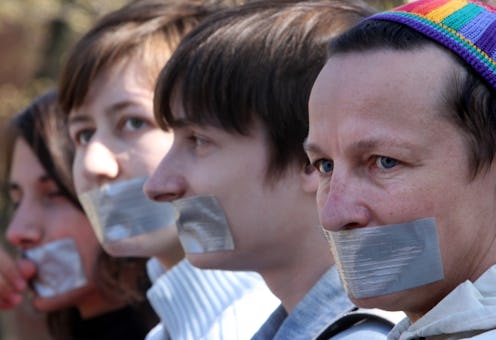Life
Students Participate In Day Of Silence
Today across the country, young people are celebrating the National Day of Silence by not speaking as a way to call attention to the silencing of LGBT youth. It's an event organized by GLSEN, the Gay, Lesbian, and Straight Education Network, and this marks its 20th year since it was first created in 1996 as a form of non-violent protest at the University of Virginia. Today, though, not everyone is convinced it's the best possible way to advance LGBT rights.
The rules of the Day of Silence are pretty simple — you don't speak all day. Which is way harder than it sounds, and I'm sure causes a lot of headaches in high school classrooms across the country given that the day is geared towards young people. The idea, though, is to attract attention. By not speaking, participants are raising awareness about LGBT bullying and the way it silences LGBT youth, as well as showing solidarity and honoring voices that have been lost.
GLSEN's director of Education and Youth Programs, Jenny Betz, told The Huffington Post, "GLSEN’s Day of Silence gives students the power to bring attention to the silencing effect of anti-LGBT language and bullying and the need to make our schools safe and affirming for all youth, regardless of sexual orientation or gender identity/expression."
And that is something that's very necessary in our society, where bullying of LGBT students is disproportionately (and appallingly) common.
However, some don't feel that asking students to stay silent is the best way to advance the cause of LGBT rights, especially not nowadays. Rather, they say that the best way to advocate for LGBT rights is to speak out, and that staying silent can send the wrong message.
On Twitter, reactions are mixed, with many expressing their support:
Other people expressed their issues with the day:
All of which are fair points.
So is Day of Silence still a useful tool in the fight for LGBT youth? I think under certain circumstances it definitely can be, especially in places where speaking out isn't really a safe or productive option for young people. But depending on the school, it may very well be true that there are much better ways to go about raising awareness and advocating for the LGBT community, especially in an environment where being outspoken very much is an option.
Regardless, however, it's still pretty cool to see thousands of young people organizing protests in their schools.
